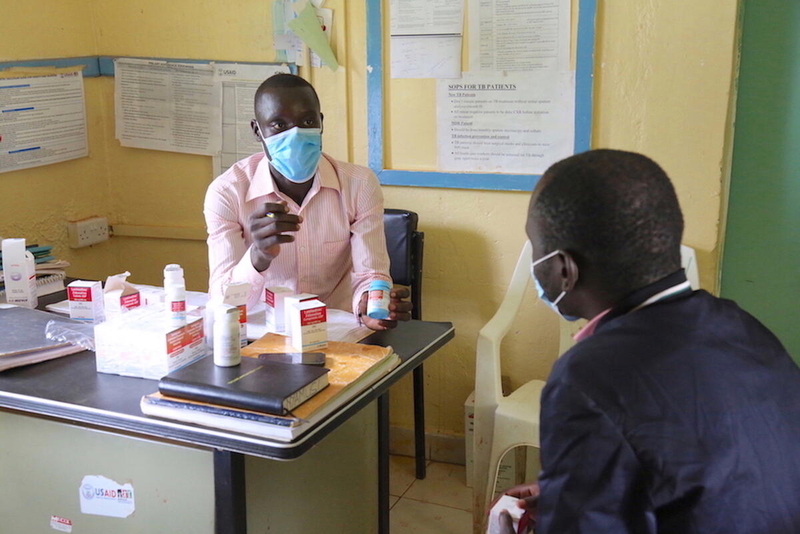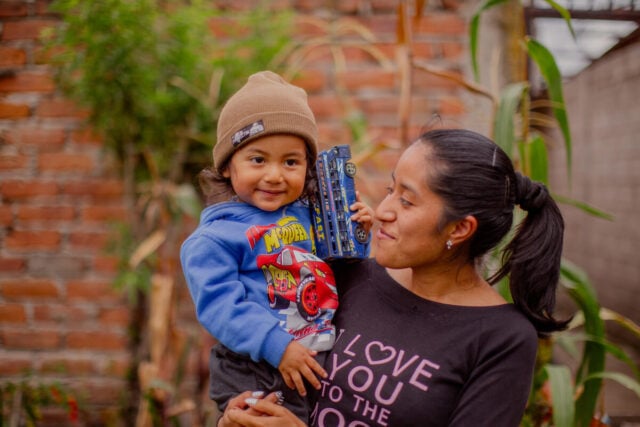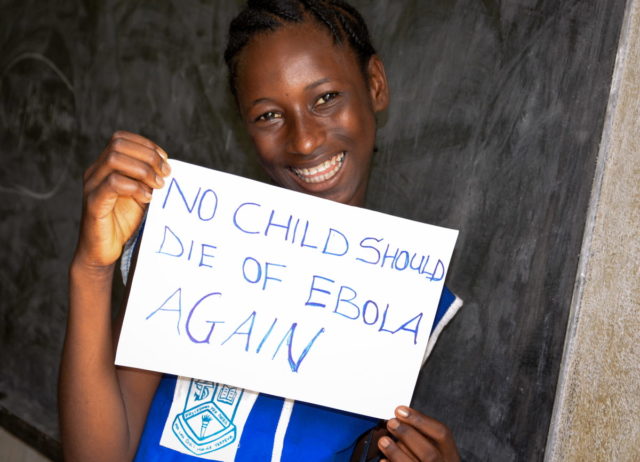When Felix was a teenager growing up in rural Kenya, he began experiencing flu-like symptoms. He didn’t initially seek medical care, and his illness continued to worsen. He finally visited a health facility, where he underwent HIV testing.
“I could not believe that the results were positive since I was a teenager, and my ways were upright,” he says. “I left the hospital disturbed and confused.”
Felix was about to start high school, and he initially lived in denial, refusing to take any medication. But the infection continued weakening his immune system to the point that the pain became unbearable. Felix, who is an orphan, shared his situation with his brother, and they went together to the hospital. The HIV diagnosis was confirmed, and Felix was urged to begin taking antiretroviral (ARV) drugs. He reluctantly started treatment, but he wasn’t taking the medicine consistently, and his symptoms persisted until he feared for his life.
World Vision encouraged him to enroll in a training that taught him about the importance of taking his ARV drugs. He finally saw how the medication could boost his immunity and help him fight infection, so he started taking it diligently. His health improved as he became a model patient, and he signed up to be a peer educator in his community to teach HIV prevention, help reduce stigma, and encourage others who were infected to take ARV drugs.

Education and medicine saved his life, but they also helped ensure that he didn’t pass the disease on to his wife after they got married and that she was able to give birth to an HIV-negative child. Felix and his family are part of the 25 million lives saved as a result of a U.S.-led program called the President’s Emergency Plan for AIDS Relief, better known as PEPFAR.
You can help ensure that millions more lives like Felix’s are saved. Here are the facts that you need to know about PEPFAR and how you can help.
What is the PEPFAR program?
PEPFAR is a bipartisan U.S. initiative aimed at leading the fight to eliminate HIV and AIDS as a global health threat by 2030. Congress created it, and President George W. Bush signed it in 2003.
For 20 years — across four administrations — it has had consistent bipartisan congressional support. Faith-based organizations like World Vision have been important partners in its creation, implementation, and impact. Today, PEPFAR programs are at work in more than 50 countries around the world.
PEPFAR legislation also authorizes The Global Fund to fight AIDS, tuberculosis, and malaria. The Global Fund’s efforts have saved more than 50 million lives since it began in 2002.
Why was PEPFAR needed?
PEPFAR was initiated to save lives at a time when as many as 8,000 men, women, and children were dying every single day as a result of HIV and AIDS. In the early 2000s, the world had collectively turned a blind eye to the global suffering and alarmingly high death rate of people affected by HIV and AIDS.
There was such intense stigma around the disease that sick people refused to get tested, let alone treated. That meant that they often passed the disease on to their spouses and eventually died from the disease. Mothers were then unknowingly infecting their unborn children, who were born HIV-positive.
Because HIV is most often contracted through sexual activity, there were many in the Church at the time who showed little to no compassion and took the posture that it was the result of sinful behavior, so they weren’t obligated to help. Richard Stearns, then president of World Vision and now president emeritus, urged the Church to wake up and care for those in need. The issue became a key initiative of his tenure.
Has PEPFAR been successful?
The U.S. government has invested more than $100 billion in the global HIV and AIDS response, the largest commitment by any nation to address a single disease in history. But it’s not just the largest investment. PEPFAR has also proven to be the most successful global health and development initiative by any nation in history. So far PEPFAR has:
- saved more than 25 million lives in countries most affected by the HIV and AIDS epidemic
- allowed 5.5 million babies to be born HIV-free
- reduced AIDS-related deaths by 50%
- helped train 340,000 healthcare workers to deliver and improve HIV care
- leveraged its services to help combat other global threats like Ebola and COVID-19
- reduced new HIV cases by 50% for women ages 15 to 24
- reduced new HIV cases by 65% for men ages 15 to 24
- reduced total new HIV infections in PEPFAR-supported countries by 50% between 2004 and 2020
In short, PEPFAR has changed the course of the HIV pandemic. It has allowed people to live full lives despite their HIV-positive status, and it’s helped ensure babies are born healthy, even when one or both parents are infected, thus giving children and families hope for a brighter future.
How has World Vision been involved in PEPFAR?
World Vision helped advocate for the initial proposal and creation of the program. And since then, we’ve worked alongside other faith-based organizations and Congress members in supporting and implementing the program.
World Vision also implemented the PEPFAR-backed DREAMS (Determined, Resilient, Empowered, AIDS-free, Mentored, Safe) program in Uganda. The goal was to reduce risks of early marriage, pregnancy, gender-based violence, and HIV infection for girls and encourage them to stay in school.
The DREAMS program is one of the most successful PEPFAR programs. It succeeded in:
- enrolling 44,351 adolescent girls in the program
- keeping 99% of those girls in school
- reducing their vulnerability to HIV and gender-based violence
- engaging faith leaders and congregations in girls’ advocacy, school retention, and HIV prevention
Why is PEPFAR still needed?
The work that began 20 years ago is not finished. Even with all the progress that’s been made, HIV and AIDS still affects millions of people. The current reality is:
- 10 million people still don’t have access to the ARV drugs that they need to survive and thrive.
- An estimated 210,000 adolescent girls and young women acquired HIV in 2021 alone.
- Half of children living with HIV still don’t have access to treatment.
- Half of those children will likely die before their second birthday.
The COVID-19 pandemic led to disruptions in key HIV treatment and prevention services, so we need more resources to help regain any progress that was lost. PEPFAR is still greatly needed to continue caring for and supporting people affected by HIV and AIDS.
What can I do to help ensure PEPFAR continues?
We’re glad you asked! PEPFAR expired September 30, 2023. In March, Congress renewed it for one year, extending it until March 2025. While we welcome the one-year reauthorization of PEPFAR, we continue to call on our nation’s leaders to make their long-term commitment known by returning to the program’s traditional five-year reauthorization. An HIV-free world is within reach, but we must stay the course and continue to invest in the proven programs — like PEPFAR — that have brought us this far.
You can take a minute to send a pre-filled email to your leaders asking them to reauthorize PEPFAR and help save more lives. You can also take the additional step of calling your senators and representatives for even more impact. If you want to further amplify the voices of those affected by HIV and AIDS, you can also share about the importance of PEPFAR on your social media accounts, encouraging others to contact their leaders as well.
Irene Sinoya of World Vision’s Kenya office contributed to this article.

